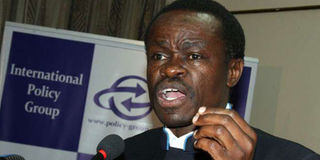We will not admit foreign students, Kenya School of Law says

Kenya School of Law CEO Patrick Lumumba addresses a forum at the Intercontinental Hotel in Nairobi on August 19, 2015. KSL will not be admitting foreign students. PHOTO | NJUGI NGUGI
What you need to know:
- Kenya School of Law Chief Executive Officer Patrick Lumumba said postgraduate students from Uganda, Tanzania, Burundi and Rwanda will no longer be accepted.
- CLE Chief Executive Officer Kulundu Bitonye said the decision was arrived at after noting an error in the procedure of admitting foreigners to the institution.
Beginning next year no foreign students will be admitted at the Kenya School of Law, a directive that has evoked flak from one of the affected countries.
Kenya School of Law Chief Executive Officer Patrick Lumumba said postgraduate students from Uganda, Tanzania, Burundi and Rwanda will no longer be accepted beginning January 2017.
Prof Lumumba, in an internal memo dated November 17, said the decision was made following a directive from the Council of Legal Education (CLE).
“We have received a letter dated October 25 from the Council of Legal Education informing us that non-Kenyans are not eligible for admission to the Advocates Training Programme (ATP) at the Kenya School of Law,” the memo reads.
“In light of the contents of the letter, non–Kenyans should stand informed that the admission committee has not considered their applications.”
CLE Chief Executive Officer Kulundu Bitonye said the decision was arrived at after noting an error in the procedure of admitting foreigners to the institution.
Prof Bitonye said the issue was discussed at a meeting on legal sector reforms convened by the office of the Attorney-General and the Department of Justice.
However, Uganda Law Society (ULS) President Francis Gimara, in a letter dated November 22 to Law Society of Kenya President Isaac Okero, said the directive is inconsistent with the spirit of liberalizing legal services in East Africa.
“Specifically, it (Kenya) made commitments on free movement of legal services and representation services in judicial procedures concerning other fields of law with no restrictions or exceptions,” the letter states.
It adds: “Further, Kenya took the lead and autonomously amended its Advocate Act to recognize and permit advocates from the region to practice law in Kenya, an act that was progressive and demonstrated good faith.”
Mr Gimara called on LSK to engage the relevant government departments in order reverse the development.





